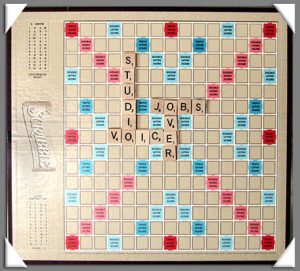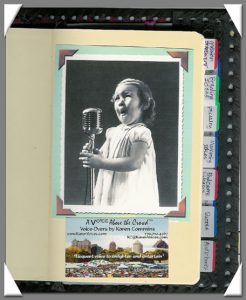Buddhist teachings refer to karma, which is the universal law of cause and effect when related to a person’s actions. Kara Edwards recently wrote about karma in her voice-over career, which is a perfect lead-in to my story today.
From childhood, I’ve always heard that it’s better to give than receive. I didn’t understand until the last few years that you actually receive by giving. Whenever I have unselfishly given my time, money and/or energy to another person or charity, I have been rewarded in surprising and unexpected ways. Kara’s story wonderfully illustrates this principle.
About the same time that Kara wrote her entry, I was contacted by a newcomer seeking advice about the voice-over industry. Each week brings similar inquiries, and I admit that I have become somewhat jaded by them. I am perpetually asked what I can do to help the person who called or wrote to me for advice. People seem to want the shortcuts to voice-over success and glory.
This time was different.
This time, the newcomer asked me what she could do to help me.
By asking that one question, she totally changed the direction of the call. That one question made me WANT to help her. My energy in talking to her changed, and my outlook toward helping newcomers was revitalized.
She also sent me a gracious thank-you note in e-mail following our conversation. With her permission, I am quoting her message and my response.
Dear Karen Commins:
Thank you for taking time this morning to answer questions about the voice over industry. I appreciate the advice you have given me and the great ideas you’ve shared.
Once again, please feel free (for free) to take advantage of the extra time I have available right now to be of benefit to you and your business. I have a BA degree in professional sales and marketing and over twenty years of successful sales experience. In addition, I am extremely familiar with following scripts through acting and telemarketing as well as proper diction through extensive vocal performance training in college. I would be willing to give you eight to sixteen hours per week of my time.
Rest assured, I am an honest, trustworthy individual whose only guilty pleasure would be a soap opera or two.
I believe one has to give in order to receive; it is the universal law of sowing and reaping. So, please consider this offer as a way in which I can plant seeds into your business in order that I may reap a harvest sometime later in my career.
All the best,
–Racquel Green, ASR
I responded as follows, with emphasis added in blue to underscore the point of this blog entry:
Racquel, you are a true delight, and you have made my day! Thank YOU for your many kind words and amazing offer of assistance. If you keep offering, somebody will take you up on it! Just don’t let anyone take advantage of you or your time; you need to get something from any business relationship.
I also believe in the universal law of sowing and reaping and can readily see that you will go far. I receive sooo many calls and e-mails from people wanting to get started in voice-over, but they haven’t learned what you already know: You have to give to get. Whatever a person feels is lacking in their world is the very thing they need to give away. You also expressed gratitude, which, again, most people fail to do.
You already have a terrific positive mindset and tremendous marketing expertise. With some training in voice-over techniques, I have every confidence that you will sow a beautiful garden of success!
In giving my permission to quote her, Racquel added:
I understand you are respectfully declining my offer, however, please know it still stands. Also, if you know of any other respected voice over talent in the area who would like to consider my offer would you please let me know?<
If any of you Atlanta voice talent can mentor a bright, upcoming talent as an unpaid intern in your studio, contact me for Racquel’s phone number! Like I said, her genuine and unique approach based on the law of giving and receiving makes me want to help her.
One last word on giving and receiving — You can’t give with the expectation of receiving. Kara and Racquel show us that the karma allows us to receive only when the purest motivations are involved.

